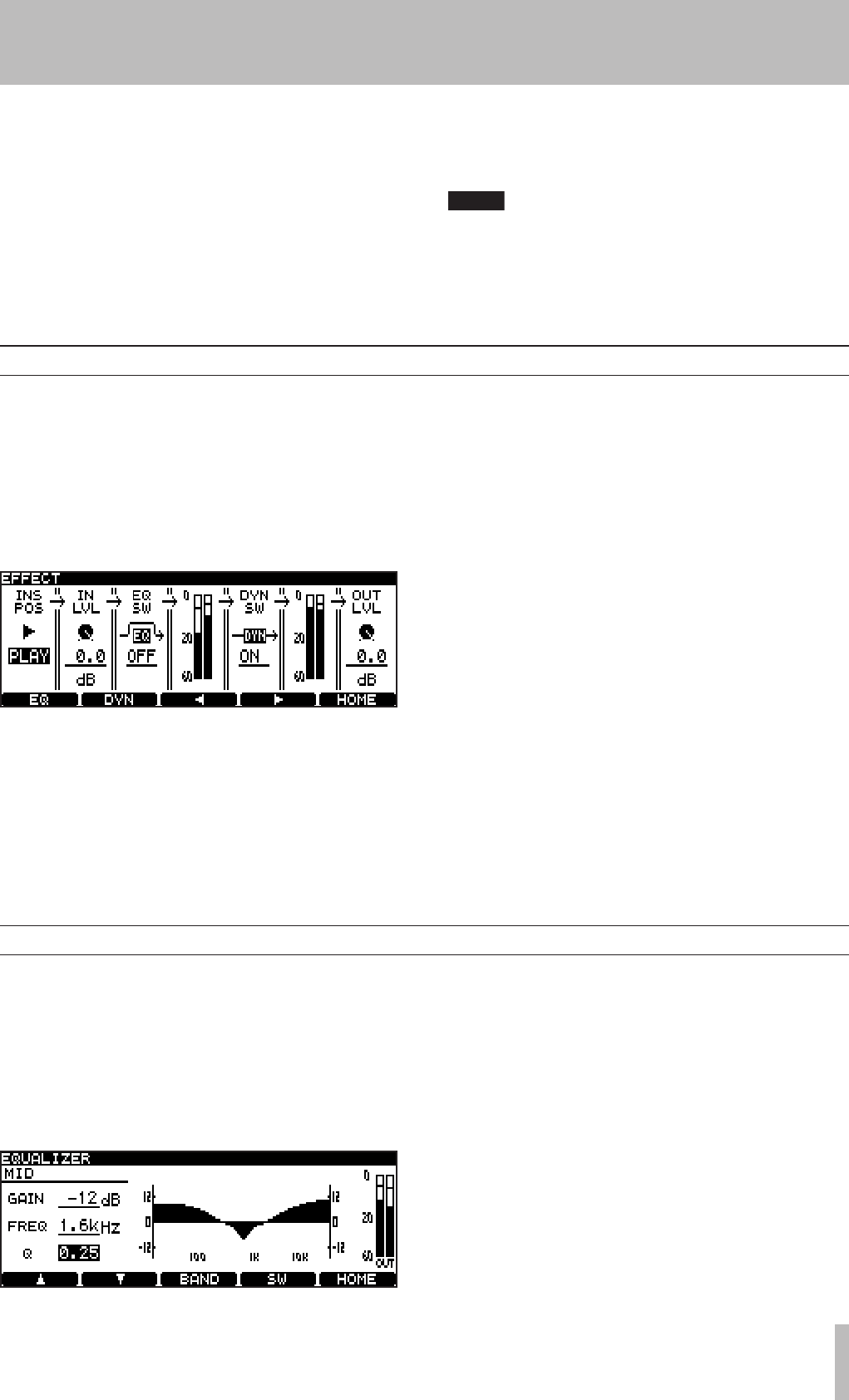
TASCAM DV-RA1000HD 55
Setting up the effect position
The EFFECT key is used to switch the effects on and
off, to set up the parameters, and to set up the position
of the effect in the signal chain.
Press and release the key to turn the effect chain on and
off (the indicator shows the status).
Press, hold and release the key to bring up the first set-
ting screen:
Figure 8.1: Effect setting screen
Use the F3 and F4 keys to move the cursor, and the
JOG/DATA dial to set values. From left to right:
The effect insertion position can be set to be
on playback or recording (PLAY or REC).
The input level to the effect processor section
can be attenuated (IN LVL) with settings from
•
•
0 dB to –72 dB and INF (full cut). Settings
between 0 and –10 dB are made in 0.5 dB
steps, settings from –10 dB onwards are
made in 1 dB steps.
The EQ section can be switched ON or OFF
(EQ SW).
The next section cannot be set, but shows the
level of the signal before the dynamics pro-
cessor.
The dynamics processor can be switched ON
or OFF (DYN SW).
The next section cannot be set, but shows
the level of the signal immediately before the
output level control.
Finally, the output level following the
dynamics processor can be set (OUT LVL), using
the same parameters as the input level set-
ting.
Press ENTER to confirm the settings (or
CANCEL to cancel them).
•
•
•
•
•
The DV-RA1000HD incorporates two signal proces-
sors: a 3-band equalization stage and a dynamics pro-
cessor. These can be inserted either before the final
recording process or on playback.
These effects can be used on playback to simulate the
effects of pre-mastering effect processing before the
mixed stereo track is actually pre-mastered in another
facility, or may be even used to perform the actual pre-
mastering.
Equalization is carried out a 40-bit resolution, and
dynamics processing is carried out at 32-bit resolution
at the same sampling frequency as the current project.
NOTE
The effects are not available in Sampling Frequency
176.4 kHz, 192 kHz, and DSD modes.
Equalization
The equalization effect has three bands: a shelving
sweepable low, a fully parametric mid, and a shelving
sweepable high.
All bands can cut or boost ±12 dB. The slope of the low
and high bands is 6 dB/octave.
1 From the effect setting screen (see Figure 8.1, Ef-
fect setting screen), press the F1 (EQ) key.
Figure 8.2: EQ setting screen
Pressing the F3 (BAND) key cycles between the
LOW, MID and HIGH bands.
Use the F1 (up) and F2 (down) keys to select
the GAIN and FREQ (frequency) parameters and
the Q parameter for the MID band.
Use the JOG/DATA dial to change the values.
As the values change, the response curve
changes to give a visual indication of the EQ
setting.
2 Press F4 (SW) to switch the EQ effect on and off.
When the effect is turned on, the response curve
is lled solid, as in the gure here (it is hollow
when the effect is turned off).
•
•
•
8 − Effects


















